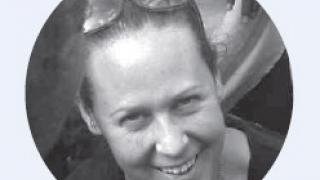
We spoke to UNA-UK young professional Erin Weir about her work for Refugees International
Tell us about your work.
Refugees International is an independent organisation with advocates like me who go to countries affected by armed conflict to identify protection gaps. All our recommendations are based on field research, so I spend three months a year interviewing displaced persons, aid workers, peacekeepers and government representatives. The rest of my time is spent in New York and Washington, where I meet UN officials, member states, US policymakers and the media to advocate for policy changes, funding and new tools to improve civilian safety and humanitarian aid in war zones.
What attracted you to this job?
Many people think civilians are harmed by accident in armed conflict, when in fact they are used as a tool of war. When civilians are the battleground, protecting them becomes much more complicated. I am drawn to the ethical imperative and intellectual challenge this poses: how can you best keep people safe when harming them is a matter of strategy?
You have worked in countries like South Sudan and the DRC. What experience has most shaped you?
Realising that the international community only reaches a fraction of those in need. The bulk of support, be it food, shelter or protection, comes from local host communities, which often face serious threats of their own. That extremely poor people are willing to do so much motivates me to press rich countries to do more.
How do the civilians you meet respond to peacekeepers?
Sometimes people are vehemently, even violently, opposed to peacekeepers but others end up with nothing but praise for them. There are many variables but, fundamentally, people want security and are receptive when they believe action is being taken to protect their communities. UN, African Union and EU peacekeepers are perceived differently on a political level but the basic rule remains – effective protection fosters legitimacy.
And how do people react to you?
I am an outsider, so there is always some level of caution, but most people seem to appreciate the opportunity to tell their stories. I try to honour their trust by translating their experiences into useful recommendations.
Is it possible, despite differences in context, to identify one key measure that would greatly enhance civilian protection?
Absolutely: consistent engagement with vulnerable communities. Good peacekeepers understand local dynamics and identify threats by talking to communities. The greater the trust they build with the people they are there to protect, the more effective they are. The UN mission in the DRC took important steps in this direction, pioneering the use of Community Liaison Assistants and testing ways for local people to contact the mission directly. These lessons are beginning to be applied in Sudan but the UN will need to continue to refine and adapt these tactics to new environments.
What would you say to those who argue that peacekeeping is nothing but a salve for the world's conscience?
UN peacekeeping is often the best tool for the job, even if it isn't perfect. Not only does the UN have more (hard-won) experience in civilian protection than most other institutions, its checks and balances, though cumbersome, mitigate state selfinterest to some extent, meaning that UN missions have more political credibility.
The US is the biggest financial contributor to UN peacekeeping, but supplies just 132 troops, experts and police. Is that the right approach?
It's unlikely that we will ever see large numbers of US troops in peacekeeping missions and, politically speaking, this is probably for the best. But the US could contribute advanced technical capabilities that many other militaries lack. I'm hopeful that the withdrawal from Iraq and the drawdown in Afghanistan will create an opportunity for the US and NATO allies like the UK to contribute more 'enabling units' – engineers, intelligence and medical units – to help missions operate more effectively.
Two situations in 2011 have been cited as examples of the 'responsibility to protect' (R2P): the robust action by UN peacekeepers in Côte d'Ivoire and the intervention in Libya.
These situations were clearly expressions of R2P but only one aspect of it: military action to halt violence already in motion. In effect, this means that opportunities to respond earlier – when deaths could have been avoided – were missed. Governments, multilateral bodies like the UN and IMF, and alliances like NATO must learn to identify risks early on so that they can take political and economic measures that will hopefully make military intervention unnecessary.
Has either situation set a precedent?
Both cases involved a very particular constellation of factors, so I don't think either will become a blueprint. Military intervention will likely continue to be the exception. That said, there is an opportunity to learn from these interventions, about minimising unintended harm, for example, and determining the dividing line between protection and regime-change.
Lastly, what does the future hold for you?
This year, I'll be returning to the DRC, South Sudan and Somalia and will participate, for the first time, in an assessment mission in Afghanistan. My programme will engage more actively with the US military on doctrine and with NGOs on training and coordination. I'm hoping this will complement the work of my humanitarian-focussed colleagues and allow RI to address more fully the spectrum of protection threats that people face every day.
Erin Weir is Senior Advocate for Protection and Security at Refugees International. She has worked with the UN Department of Peacekeeping Operations on training materials for civilian protection
